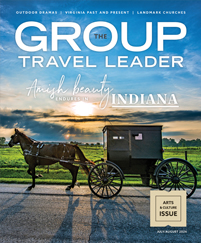
With the exception of river-based casinos, most of the tourism industry weathered the record-breaking flooding of the Mississippi River without disruption.
“Although many areas along the Mighty Mississippi are experiencing the highest flood waters in decades, the city of Vicksburg’s tourist attractions will remain open,” the Vicksburg, Miss., CVB said in a release.
“A portion of the area below the bluff will certainly be affected by the flooding,” said Natchez, Miss., director of tourism Connie Taunton, “but it won’t interfere with any tours, events or businesses that visitors come to Natchez to enjoy.”
One of the hardest hit areas was Tunica, Miss., where all nine casinos were closed. However, by May 20, three of the casinos — Gold Strike, Tunica Roadhouse and Horseshoe — had reopened.
“Tunica is open,” the convention and visitors bureau posted on its website May 19. “We may not be at 100 percent yet, but then again who is after Ole’ Man River punches you in the gut.”
Several Tunica businesses and attractions on the protected side of the levee, including, spas, golf courses, Main Street, Casino Factory Shoppes and all locally owned hotels, remained opened.
Dinner theater flooded
The Imperial Dinner Theatre in Pocahontas, Ark., was extensively damaged by floodwaters after a levee break on the Black River. Although the lobby and kitchen were spared, several feet of muddy water filled the auditorium.
“The stage, which is made of wood, was submerged and will have to be replaced entirely,” said board chairman Brett Cooper. “Carpeting and most tables and chairs are also a total loss.”
The tourism industry in Memphis, Tenn., weathered the flooding with no major disruptions.
“The river may be high, but we are dry,” said Alissa Clark of the Memphis Convention and Visitors Bureau.
Downtown Memphis is the highest elevation on the Mississippi between Cairo, Ill., and Natchez and suffered no damage, including the Beale Street entertainment district. Memphis in May’s World Championship Barbecue Cooking Contest was relocated to the Memphis Fairgrounds and went on as usual in mid-May.
In Alabama, most tourist attractions were not damaged by the deadly outbreak of tornadoes that swept through the state April 27, killing several hundred people, and the tourism industry was quick to assist victims.
Provided assistance
Within a week, most of the attractions, hotels and restaurants that had been closed because of lost power had reopened, and many restaurants provided free food to victims, first-responders and volunteers while hotels provided temporary shelter to thousands whose homes had been damaged or destroyed.
The Auburn-Opelika Tourism Bureau gathered household items for victims in Tuscaloosa, the Alabama Hospitality Association sought donations, the Alabama Mountain Lakes Tourism Association mounted a drive for necessities for victims in its 16-county area and the Alabama Travel Council directed its members to various volunteer organizations.
The American Bus Association’s board of directors met in Birmingham in the wake of the tornadoes and raised more than $30,000 for the United Way of Alabama.
The Talladega Superspeedway raised money for the relief effort by letting individuals drive their personal vehicles around the track’s famed high banks May 6-8 for a $50 donation to the American Red Cross.
Five of the six Alabama state parks that were closed due to storm damage had reopened by mid-May. They were Buck’s Pocket, Cathedral Caverns, DeSoto, Monte Sano and Rickwood Caverns.
The most heavily damaged park, Lake Guntersville State Park, remained closed until utilities were restored. The park’s lodge, convention center, restaurant and many hotel rooms received only minor damage and were tentatively scheduled to reopen by Memorial Day or the first week in June.
In Louisiana, the U.S. Army Corps of Engineers opened the Bonnet Carré Spillway to divert excess river flow eastward into Lake Pontchartrain north of New Orleans, leaving river-related tourism offerings in the city unaffected by high water, including the city’s cruise industry.










